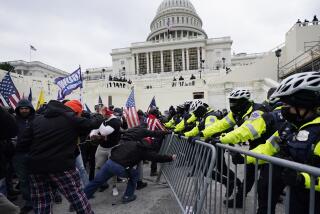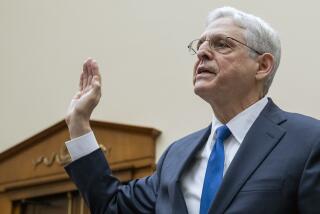Former FBI chief Comey says he was fired to stop Russia inquiry, and accuses Trump of ‘lies, plain and simple’

Former FBI Director James B. Comey testified before the Senate Intelligence Committee on Thursday. He addressed his firing in his opening statement and said goodbye to co-workers.
- Share via
Reporting from Washington — In an explosive hearing, former FBI Director James B. Comey told Congress on Thursday he believed President Trump fired him to impede the FBI’s Russia investigation, and described the president’s claims that the FBI was poorly led and in disarray as “lies, plain and simple.”
“It’s my judgment that I was fired because of the Russia investigation,” Comey told the Senate Intelligence Committee during a three-hour hearing broadcast live on every major TV network. “I was fired in some way to change — or the endeavor was to change — the way the Russia investigation was being conducted.”
Comey also said he decided to write memos for the FBI after his meetings and phone calls with Trump because he didn’t trust the president to tell the truth.
“I was honestly concerned that he might lie about the nature of our meetings,” said Comey, a registered Republican most of his life who previously served under Presidents George W. Bush and Obama.
Comey’s charges provided riveting political drama but no new bombshells about Russian meddling in the 2016 election or improper contacts by the Trump campaign or the White House with Russian authorities. It concluded with the certainty that what Trump has called the “cloud” of criminal and congressional investigations will not lift anytime soon.
The White House denied Trump was a liar, and Trump’s personal lawyer declared that Comey’s testimony “completely vindicated” the president by affirming that he wasn’t personally under investigation.
Trump “never, in form or substance, directed or suggested” that Comey halt an FBI investigation, the lawyer added, and never demanded Comey’s loyalty, as the former FBI chief alleges.
Sitting ramrod straight, Comey held center stage as a veteran lawman with a sober, just-the-facts mien, taking careful aim at a president who he said had defamed him and impugned the FBI.
At times he mixed an aw-shucks style with a subtle knife twist. He noted that after he was fired May 9, Trump had tweeted that Comey “better hope that there are no ‘tapes’ of our conversations before he starts leaking to the press!”
“Lordy, I hope there are tapes,” Comey said Thursday, saying recordings would confirm his account. But he suggested Trump’s threat had backfired spectacularly.
Comey said he “woke up in the middle of the night” a few days later “because it didn’t dawn on me originally that there might be corroboration for our conversation. There might be a tape.”
He testified that he decided to send copies of his memos about his conversations with the president to a friend, a professor at Columbia Law School later identified as Daniel C. Richman, with instructions to give them to a reporter at the New York Times.
“I asked my friend, ‘Make sure this gets out,’” Comey said. “I thought that might prompt the appointment of a special counsel.”
The strategy paid off when the Justice Department appointed former FBI Director Robert S. Mueller III as a special prosecutor for the overlapping counter-intelligence and criminal investigations, a move meant to limit the possibility of White House interference.
Comey said he gave his copies of the memos to Mueller, but said Richman might still have them too. Comey said he would be happy to have the memos released — along with any Oval Office tapes, if they exist.
Richman declined to comment Thursday. The White House said it had no comment on whether tapes exist.
Comey said Trump sought repeatedly to get him to publicly declare the president was not under investigation. Comey said he declined to do so because he would have to declare otherwise if the focus of the inquiry shifted to Trump.
He said he first told the president he wasn’t under investigation because he worried Trump would believe the FBI was out to get him — what Comey called “kind of a J. Edgar Hoover-type situation.” Hoover collected intelligence for political blackmail in his nearly five decades as FBI chief.
Comey also complained that he thought Trump sought a “patronage relationship” in which the FBI director was beholden to the president, a status he said was highly inappropriate.
“The statue of Justice has a blindfold on because you’re not supposed to be peeking out to see if your patron is pleased or not with what you’re doing,” he said.
None of the Republicans on the panel challenged Comey’s recollection of his conversations with Trump, although several pressed him to explain why he had not objected to Trump at the time or raised his concerns with Atty. Gen. Jeff Sessions or members of Congress.
Several also seized on Comey’s confirmation that he had told Trump he was not under investigation, noting that it was among the few facts that had not leaked.
As many Americans sat glued to TV sets and digital screens, Trump met with Secretary of State Rex Tillerson, Secretary of Defense James N. Mattis and other senior aides, and watched parts of the hearing from the White House dining room, aides said. The president did not tweet once or mention Comey during a speech later at a Faith and Freedom Coalition conference.
The White House refused to comment on the substance of Comey’s testimony, although Deputy Press Secretary Sarah Huckabee Sanders responded angrily when asked about his charge that the president had lied.
“No, I can definitively say the president is not a liar,” she told reporters. “It’s frankly insulting that that question would be asked.”
Your guide to watching Comey’s testimony »
After the hearing, Trump’s personal lawyer, Marc Kasowitz, said Comey had “completely vindicated” the president, but blasted Comey for leaking memos of their private conversations.
Kasowitz denied key parts of Comey’s account, saying Trump never asked Comey to back off the investigation of national security advisor Michael Flynn or asked Comey for a loyalty pledge.
“Mr. Comey has now finally confirmed publicly what he repeatedly told the president privately: The president was not under investigation as part of any probe into Russian interference,” Kasowitz said.
He also blasted Comey for disclosing his talks with Trump, calling them “privileged communications” that should not be made public.
Comey described a series of awkward and often tense conversations with Trump that he said were unique in his experience.
He recalled how Trump ordered Sessions, senior advisor Jared Kushner and others out of the Oval Office on Feb. 14 so he could address Comey in private, a day after Flynn was forced to resign for lying about his contacts with the Russian ambassador.
“I hope you can see your way clear to letting this go,” Comey quoted Trump as saying.
Comey did not say whether he believed Trump sought to obstruct justice, as some Democrats allege, and avoided expressing an opinion as to whether the president broke the law. But he said he understood Trump’s statement was aimed at getting him to throttle back the Flynn inquiry.
“I took it as a direction,” Comey said. “I mean, this is the president of the United States, with me alone, saying, ‘I hope’ this. I took it as, this is what he wants me to do.”
“I took it as a very disturbing thing, very concerning, but that’s a conclusion I’m sure the special counsel will work towards, to try and understand what the intention was there, and whether that’s an offense,” he said.
Sen. Jim Risch (R-Idaho) suggested to Comey that Trump’s request could not be considered obstruction of justice because the president did not order him to do anything.
But Comey explained why he understood Trump’s “hope” as a directive.
“It rings in my ear as kind of, ‘Will no one rid me of this meddlesome priest?’” he said, referring to King Henry II’s statement about Thomas Becket, the archbishop of Canterbury killed by the king’s knights in 1170.
Comey conceded he could have warned Trump he was crossing an ethical and potentially legal line.
“Maybe if I were stronger, I would have,” he said. “I was so stunned by the conversation that I just took it in.”
Comey disclosed publicly for the first time that investigators are looking into whether Flynn misled FBI agents who interviewed him Jan. 24 about conversations with Russian Ambassador Sergey Kislyak.
Asked by Sen. Tom Cotton (R-Ark.) whether Flynn deceived FBI agents, Comey said he couldn’t answer in detail because “that was the subject of the criminal inquiry.”
As the highly anticipated hearing began, the panel’s chairman, Sen. Richard Burr (R-N.C.), and vice chairman, Sen. Mark Warner (D-Va.), praised Comey, rebutting efforts by the White House and its allies to portray him as unreliable.
Burr complimented Comey’s “dedicated service and leadership” at the FBI. “Your appearance today speaks to the trust we have built over the years,” he said.
Warner defended the committee’s investigation, saying it is “not a witch hunt; it is not fake news — it is an effort to protect our country” against a “foreign operative seeking to hijack our most important democratic process,” a presidential election.
Twitter: @davidcloudLAT
Twitter: @jtanfani
ALSO
Your guide to watching Comey’s Senate Intelligence Committee testimony
Comey’s testimony: What could hurt Trump and what might help him
Trump demanded ‘loyalty’ and asked for an end to the Flynn investigation, Comey will testify
UPDATES:
4:10 p.m.: This article has been updated with response from President Trump’s lawyer and other details.
1:50 p.m.: This article has been updated with new details from the Comey hearing.
9:15 a.m.: This article has been updated with Comey’s response to a question from Sen. Tom Cotton (R-Ark.).
8:05 a.m.: This article has been updated with additional testimony.
7:35 a.m.: This article has been updated with the beginning of Comey’s testimony before the committee.
This article was originally published at 3 a.m.
More to Read
Get the L.A. Times Politics newsletter
Deeply reported insights into legislation, politics and policy from Sacramento, Washington and beyond. In your inbox twice per week.
You may occasionally receive promotional content from the Los Angeles Times.












